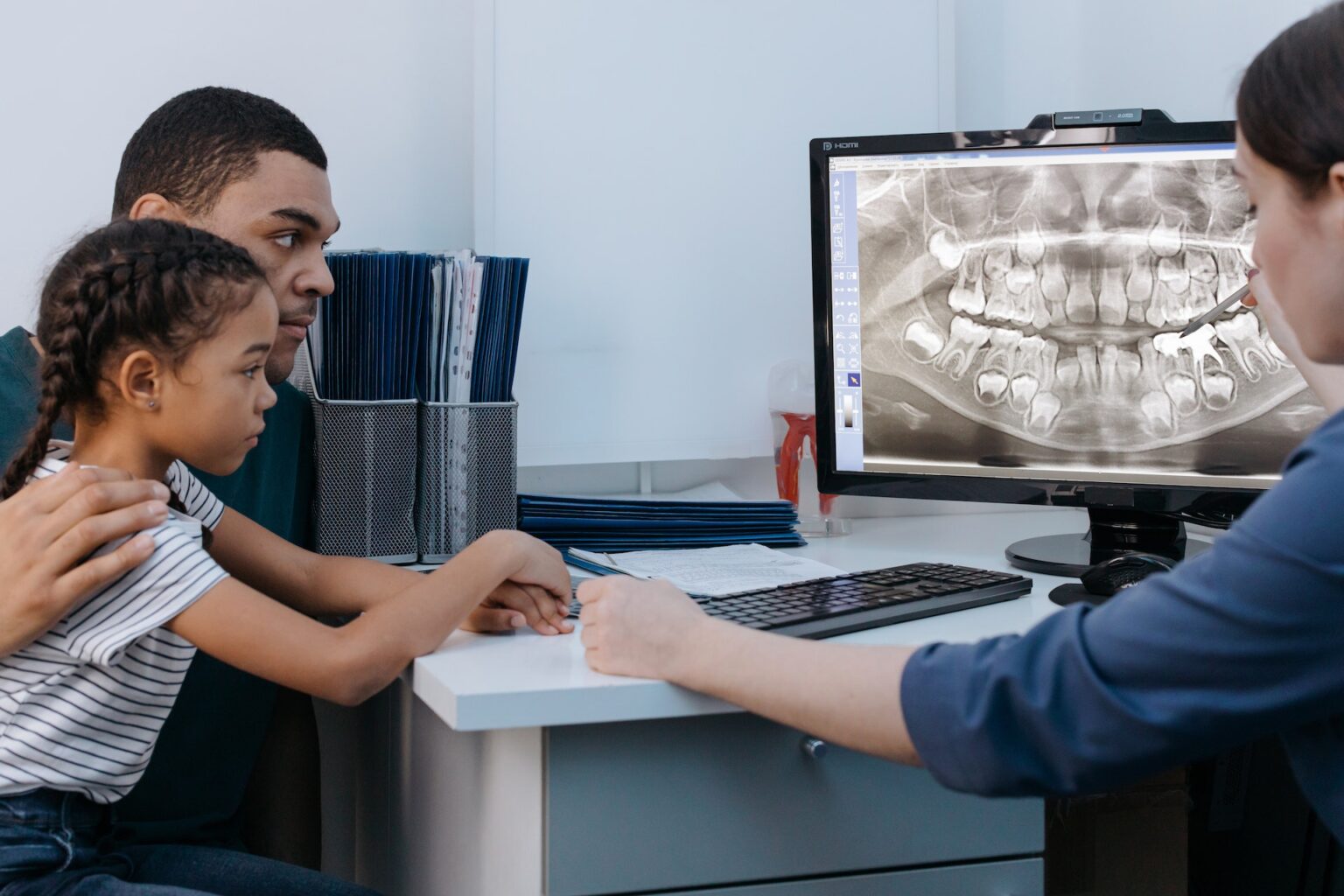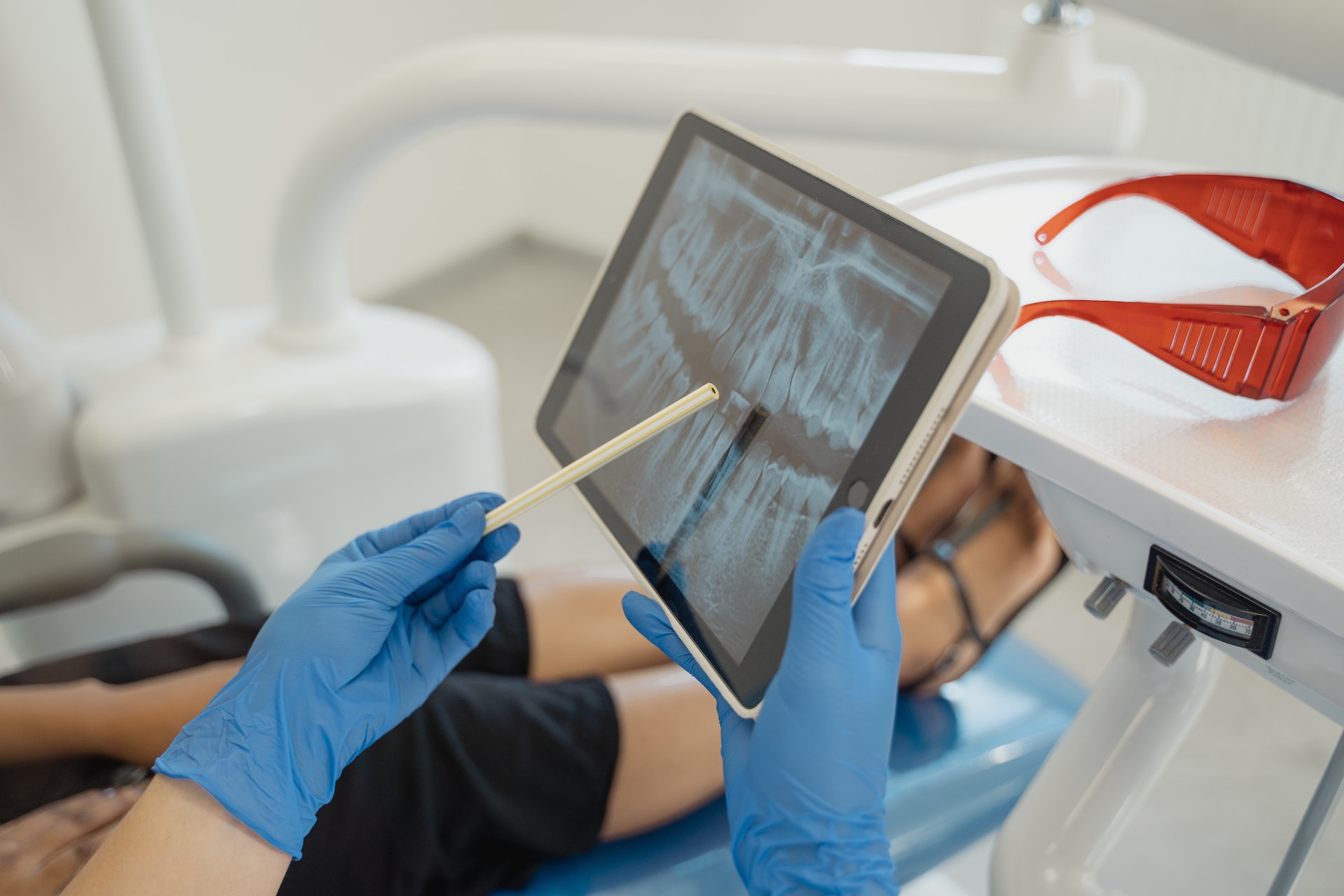Most dentists recommend that patients receive X-rays once per year — but, are they necessary?
The American Dental Association (ADA) does recommend updated X-rays at least once every twelve months, and many offices use modern technology that drastically reduces the amount of radiation patients are exposed to compared to the X-rays of several decades ago. Modern digital X-rays are safe for patients of all ages, and the consequences of not receiving an X-ray could lead to significant dental problems down the road. Here’s everything you need to know.
Why Do Dentists Use X-Rays?
Even the most skilled dentists can’t see everything about your teeth just by looking. Tooth decay can develop under the surface, and many early alignment issues are harder to notice with the naked eye.
Nearly every oral disease is preventable when caught early. Dental X-rays are a diagnostic tool that helps dentists diagnose any potential oral health problems which are not immediately visible during a regular oral health examination. When a patient goes for a regular oral health check-up, a dentist may recommend getting a dental X-ray if they believe that there is an underlying issue, or simply to make sure that no new problems are developing.
Dental X-rays are safe and necessary if you are already suffering from a pre-existing oral health issue like cavities or tooth decay. For children and teenagers, dental X-rays are necessary to check the development of their teeth.

Problems That X-Rays Detect
Dental X-rays give a complete picture of the patient’s mouth and allow dentists to notice symptoms of many issues. Here are some of the most common:
- Tooth decay and cavities: Cavities most commonly develop in the places that are hard to brush, and these also happen to be the places that are hardest to see — like in between teeth or near the gumline. Dental X-rays can spot these cavities before they grow into something much larger. Tooth decay similarly can start developing underneath dental fillings, which can be impossible to detect without an X-ray.
- Jaw alignment and bite problems: Many patients suffering from migraines or chewing problems suffer from improper jaw alignment. A dental X-ray can provide crucial information about the structure and alignment of the jaw, which can help experts understand where to make corrective measures.
- Gum disease: Dental X-rays are necessary if your dentist believes that there is bone loss, which is often associated with gum disease. A dental X-ray can show any changes in the structure of a patient’s teeth.
- Oral infections: Changes in the root canal or an abscess are visible through dental X-rays, but they’re impossible to see otherwise. If a patient has recently undergone a root canal or any other procedure with a high chance of infection, a dentist can request a dental X-ray.
If a patient is preparing for any dental procedure such as a tooth implant, dentures, or even braces, a dental X-ray is necessary to ensure that the procedure goes smoothly as planned. If your dentist sees something concerning during the preliminary dental X-ray, they may make alterations to your procedure to increase your chances of success.
Types of Dental X-Rays
Two main types of dental X-rays are in use today: extraoral (outside the mouth) and intraoral (inside the mouth). Intraoral are the most common dental X-rays in Grand Prairie, and they provide comprehensive detail about the state of the patient’s teeth. They can enable a dentist to find cavities, check developing teeth, and monitor the development of growing teeth.
Extraoral X-rays show the exterior components of the teeth, mainly focusing on the jaw and skull. This is another type of safe dental X-ray that is helpful when the development or structure of the jaw needs to be monitored.
How Often Do Dental X-Rays Need To Be Scheduled?
Once you become aware of how dental X-rays are necessary for optimal oral health, you may also want to understand how frequently they should be done. Just like every patient’s oral health is subjective, the number of times they should undergo a dental X-ray can also vary. Your dental history and current oral health can play a huge role in how many dental X-rays a dentist may recommend.
Even though the ADA recommends once every 12 months, realistically, those with no recent dental issues or infections may not need an X-ray every year. On the other hand, those suffering from an active condition, infection, or disease may need to get one every six months. If you are a new patient, your dentist may want you to take a dental X-ray to determine whether there are any pre-existing problems and monitor changes over the years using the initial X-ray. It can be recommended for patients of all ages, from children to adults without teeth.
Are Dental X-Rays Safe?
Many people question the safety of dental X-rays, and while there is some radiation involved, it is far from being a harmful dose. Humans are naturally exposed to radiation in a lot of forms, whether it’s from the sun, home appliances, or cosmic rays. Comparatively, the dose of radiation that is emitted through dental X-rays is small.

With advanced technology, the dangers that once came with dental X-rays are greatly reduced. If you are still concerned about the radiation exposure from dental X-rays, it can be worthwhile to speak with your dentist. However, most dentists will only recommend dental X-rays as a necessity to provide better services.
Schedule Your Dental X-Ray in Grand Prairie with Definitive Dental
When you are looking to schedule a necessary but safe dental X-ray, Definitive Dental can help. Our state-of-the-art technology allows for digital X-rays, which greatly minimizes radiation exposure. Our dental X-rays only result in a minimal amount of radiation, similar to the radiation you would be exposed to during a 12-second phone call. We provide cosmetic dentistry and family dentistry as well to holistically meet your dental needs.
With more than 400 5-star reviews and our friendly, caring staff, we are confident that we can cater to your needs. We are committed to an excellent patient experience, with a pain-free guarantee on all our procedures!
Contact us today by filling out our contact form or giving us a call at (972) 646-0660. We are ready to take your smile to new heights, together!






